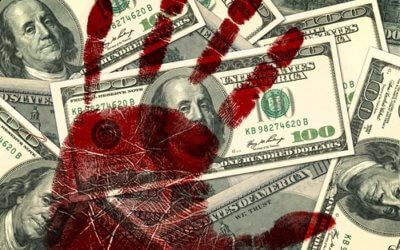As someone who didn’t grow up in the U.S., I have a different view of time and certainty. When I arrived, I was always amazed at how people planned for longer and longer events that were way out into the future, but with a certainty that everything would go to plan, e.g., in estate planning, using generation-skipping trusts.
For me, the U.S.’s long-term view reminded me of Issac Asimov’s trilogy, the Foundation, when the Mule appears, unforeseen, and topples the Foundation contrary to expectations. In the U.S. I see the overwhelming belief that everything will fine in the long term, and while there are outlining events, everything reverts to the mean. However, there are always unforeseen events that can disrupt the trend and cause it never to return to the prior norm.
I grew up in South Africa, and many of my parent friends had done the long constant migration south. They lived in the Republic of the Congo, today the Democratic Republic of the Congo. With independence in 1960, the military revolt, the succession of Kantaga, and the influx of mercenaries and paramilitary troops to protect mining interests, they fled, many moving to Zambia where their mining skills were in demand. Zambian independence in 1964 and the fears over privatization starting in 1968, they moved onto Rhodesia, now Zimbabwe. With Rhodesia’s Unilateral Declaration of Independence “UDI” from the United Kingdom in 1965, the civil war began, which lasted until 1980 with free elections.
Many decided to move further south to South Africa, a country bound to be stable and prosperous. These moves were often made in a rush, as power structures changed, and in most cases, they lost everything they had during each relocation. Unfortunately, in South Africa, the 1976 Soweto uprising was the beginning of the end for the minority white government; it would take nearly twenty years for that to occur. My parents knew many of these people were too old to move once more and stayed on, seeing wealth evaporate with a declining economy, currency, and sanctions.
I know of a family in Zimbabwe where the patriarch was a multi-millionaire. On his death, he left everything in trust for seven beneficiaries – each receiving over a million, with the trustee’s stipulation to invest the funds in Zimbabwe. As Zimbabwe’s economy collapsed in the 2000s, with hyperinflation hitting its peak of at an estimated 79.6 billion percent month-on-month in November 2008, the value of the trust’s assets declined. The trustee, a corporation, could not move the funds overseas due to currency restrictions and would not disburse the funds to the beneficiaries because of the terms of the trust. Today each beneficiary’s interest will buy them less than a tank of gas for their car.
Finally, I attended boarding school in Switzerland in 1973. A Lebanese friend of mine’s father had interests in Lebanon and started a new business in Iran because he thought diversification was a good idea. In 1975 the Lebanese Civil war started, which was to continue to 1990, but the troubles continue. That war cost them nearly everything they had in Lebanon; however, the Iranian business did well. Having seen what had happened, he bought properties in New York, London, and Cayman as further diversification and protection. January 1979, his father was in New York watching the Shah leave and the riots and saw the bank, which held his accounts, burn. They never returned to Iran, but thankfully the portfolio of properties kept them financially afloat.
Why these stories, well, we have seen in the six months with COVID, how the world has changed. What we took for granted is no longer sure. When will return to “normality,” who knows, but according to Dr. Fauci, sometime in late 2021? As I have said in this newsletter many times, your old business plans, strategy, and financial models need to go out the window, and new ones prepared in light of what is happening.
I would add to that, as you consider the long-term outlook and your business and investment portfolio, I would look for hedges to protect for large unforeseen events. Following Nassim Taleb’s barbell strategy – you avoid the middle in favor of a linear combination of extremes across all domains from politics to economics to one’s personal life.
There is talk of the dollar falling in value and possibly losing its reserve country status. How long it takes the U.S. to recover from COVID is another uncertainty as we have yet to find a strategy. Will the U.S. and China go to war over Taiwan? What will these events do to your business? Thus, I would consider other parts of the country, other countries in supply chain protection, concerning investments, international assets as a hedge.
As for looking outside the U.S., I would not claim the authority to recommend any particular country. I definitely would not follow the Englishman’s steps in 1980; deciding the world was unsafe, moved to the Faulkland Islands as he determined the safest place to be. Less than two years later, the Argentine invaded, and the Falklands War got going.
However, realize nothing is certain! Trends don’t last forever, and while things revert to the mean, there will be a new mean after massive disruptions. Take the lesson from COVID to reexamine everything and do it regularly. Complacency has enormous costs. As David Mitchell put it so well in Cloud Atlas, when two people are discussing revolutions,
“Fantasy. Lunacy.”
“All revolutions are until they happen, then they are historical inevitabilities.”
I am not saying revolution is coming, but large, unpredictable things are, and like revolutions, most will all be historical inevitabilities, as COVID was!
Recent Posts
Align and Thrive: The Importance of Organizational Alignment and Agility
Discover the importance of organizational alignment and agility in this blog post. Learn how establishing a strong CORE and building a strategy around it can lead to sustainable growth and success. Find out how alignment and agility empower your organization to thrive in an ever-changing business landscape.
How to Achieve Smart Time Management: 10 Tips for Busy Professionals
When you are a busy professional running your own business, it can often feel like there aren’t enough hours in the day to accomplish everything. Being strategic with your time is the best (and possibly the only) way to achieve all of your daily tasks. If you are...
5 Strategic Leadership Skills Every Manager Needs
So often, people view leadership as a talent: you’re either born with this quality or you’re not. However, this is not always the case! In reality, good leadership is made up of skills, and anyone can learn how to improve. Some people may pick up leadership attributes...
How the Sellability Score is Calculated: The Ultimate Guide
Do you have questions about how to calculate your business’s sellability score? Whether you’re looking to sell your business in the near future or years from now, understanding your sellability score will help you thrive. The sellability score identifies the...
The Top 5 Benefits of the Entrepreneurial Operating System
As an entrepreneur running your own business, you know there are bumps in the road and struggles that both you and your business will face over time. However, with the right people and tools at your disposal, you can anticipate what’s coming, plan for it, and continue...
5 Ways to Use Email Automation to Boost Traffic
Every single business in the world wants to evolve and grow. This will happen using a variety of techniques and strategies. In 2022, digital marketing is more than a household name, and most companies will adopt at least a few ideas when long-term planning and coming...
6 Questions To Ask A Potential Business Coach Before Hiring Them
Many entrepreneurs consider executive business coaching when they start struggling on their professional path. A small business coach is an experienced professional mentor who educates, supports, and motivates entrepreneurs. They will listen to your concerns, assess...
3 Ways Proper Long Term Strategic Planning Helps Your Business
Dreams turn into goals when they have a foundation of long-term strategic planning supporting them. They become reality when the ensuing strategic implementation plan is executed properly. With Kaizen Solutions as their strategic planning consultant, small and...
What is a Peer Group, and How Can it Improve Your Career?
If you are a CEO or key executive who has come to a crossroads or crisis in your career, you'll gain valuable insights and solutions from a peer group connection more than anywhere else. But what is a peer group, and how can that statement be made with so much...
Profit and Revenue are Lousy Core Values
As I mentioned last week, I am down with COVID and tired, so spending more time reading rather than working. I read Bill Browder's Freezing Order this weekend, and I highly recommend it. However, at the end of the book, Browder says that oligarchs, autocrats, and...










